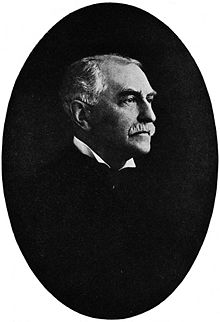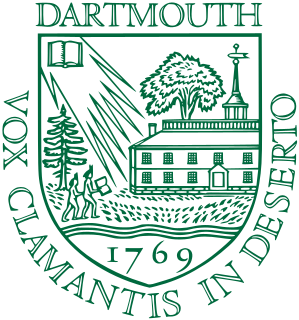Dartmouth presidency
The New York City American, in a September 30, 1926 obituary notice, wrote of William Jewett Tucker that he "was known in New England as 'the great president,' who brought Dartmouth from the position of a small New Hampshire college to that of a great national educational institution." One of the college's most beloved leaders, William Jewett Tucker was said to have "refounded Dartmouth," bringing its facilities, its curriculum and every aspect of its organization into the modern era. When he assumed the presidency in 1893, the college was in debt, there were only slightly over 300 students and there was no central physical facilities plant. When he stepped down in 1909 more than 20 new buildings had been erected, including a central steam plant; the student body had grown to over 1,100 students from across the country and around the world; the faculty had increased from 26 to 81; and the curriculum had been broadened.

New England is a region composed of six states of the northeastern United States: Maine, Vermont, New Hampshire, Massachusetts, Rhode Island, and Connecticut. It is bordered by the state of New York to the west and by the Canadian provinces of New Brunswick and Quebec to the northeast and north, respectively. The Atlantic Ocean is to the east and southeast, and Long Island Sound is to the south. Boston is New England's largest city as well as the capital of Massachusetts. The largest metropolitan area is Greater Boston with nearly a third of the entire region's population, which also includes Worcester, Massachusetts, Manchester, New Hampshire, and Providence, Rhode Island.
Tireless in his efforts to build the physical college, President Tucker was also equally devoted to articulating a moral and spiritual dimension for Dartmouth and for higher education nationwide. In numerous books and essays he called for a liberalization of American theology and commitment to public service.
William Jewett Tucker graduated from Dartmouth in 1861 and studied for the ministry at Andover Theological Seminary. Ordained in 1867, he was a Congregational pastor in Manchester, New Hampshire, and, later, in New York City. He returned to Andover in 1879 as professor of sacred rhetoric and became an editor of the Andover Review and a founder of The South End House, one of Boston's first settlement houses for the poor. At Andover, he was a central figure in the "Andover Controversy" of 1886–92, when charges were filed against five professors calling for a liberalization of Congregational views. In 1890, the Supreme Court of Massachusetts declared the proceedings "faulty"; in 1892, all five professors, Tucker included, were "acquitted."

Andover Theological Seminary is located in Newton, Massachusetts. Andover Theological Seminary and Newton Theological Institution merged formally in 1965 to form the Andover Newton Theological School.

Congregational churches are Protestant churches in the Reformed tradition practicing congregationalist church governance, in which each congregation independently and autonomously runs its own affairs.
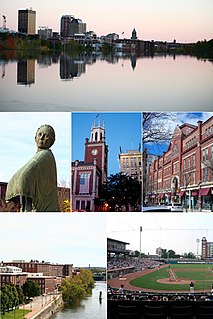
Manchester is a city in the southern part of the U.S. state of New Hampshire. It is the most populous city in northern New England, an area comprising the states of Maine, New Hampshire, and Vermont. As of the 2010 census the city had a population of 109,565, up slightly to 111,196 in a 2017 estimate. The combined Manchester-Nashua Metropolitan Area had a 2010 population of 400,721.
William Jewett Tucker retired from the Dartmouth presidency in 1909 and became president emeritus. Although retired, he remained an active figure on the public stage and lived in Hanover until his death in 1926.

Hanover is a town along the Connecticut River in Grafton County, New Hampshire, United States. The population was 11,260 at the 2010 census. CNN and Money magazine rated Hanover the sixth best place to live in America in 2011, and the second best in 2007. "This just might be the best college town," read the headline of a story in the January–February 2017 issue of Yankee.
The William Jewett Tucker Center, commonly known as the Tucker Center, at Dartmouth College, is named after President Tucker.
This page is based on this
Wikipedia article Text is available under the
CC BY-SA 4.0 license; additional terms may apply.
Images, videos and audio are available under their respective licenses.
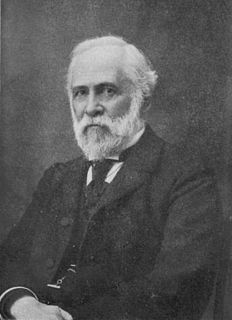
Charles Augustus Young one of the foremost solar spectroscopist astronomers in the United States, died of pneumonia after a brief illness, at his home in Hanover, New Hampshire, on 4 January 1908. He observed solar eclipses and worked on spectroscopy of the Sun. He observed a solar flare with a spectroscope on 3 August 1872, and also noted that it coincided with a magnetic storm on Earth.

George Higgins Moses was a U.S. diplomat and political figure. He served as a United States Senator from New Hampshire and was chosen as the Senate's President pro tempore.
John Sloan Dickey was an American diplomat, scholar, and intellectual. Dickey served as the 12th President of Dartmouth College, Hanover, New Hampshire, from 1945 to 1970, and helped revitalize the Ivy League institution.
The Rev. Francis Brown, American Semitic scholar, was born in Hanover, New Hampshire.
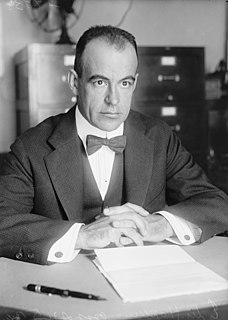
Ernest Martin Hopkins served as the 11th President of Dartmouth College from 1916 to 1945.
Roswell Dwight Hitchcock was a United States Congregationalist clergyman.

George Trumbull Ladd was an American philosopher, educator and psychologist.
Nathan Lord was a U.S. Congregational clergyman and educator.

George Harris Jr. was an American minister and College president.

The School of Divinity at Yale University, in New Haven, Connecticut, is one of twelve graduate or professional schools within Yale University.

James Willis Patterson was an American politician and a United States Representative and Senator from New Hampshire.
Charles Augustus Aiken (1827–1892) was a clergyman and academic.
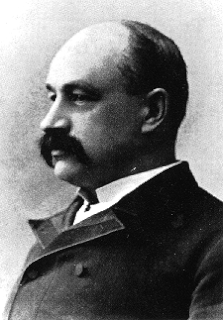
Charles Sumner Murkland was the first elected President of the New Hampshire College of Agriculture and the Mechanic Arts following the college's move from Hanover to Durham in the United States. While a scholar and executive, his lack of an agricultural background made him a surprising choice for the position. While President, Murkland proposed adding preparatory classes and a two-year degree and during his first year Graduate study was also established.
Andover Newton Theological School (ANTS) was an American graduate school and seminary located in Newton, Massachusetts, United States. Affiliated with the American Baptist Churches USA and the United Church of Christ, it was an official open and affirming seminary.
Asa Mahan was a U.S. Congregational clergyman and educator and the first president of Oberlin College and Adrian College.

The Green is a grass-covered field and common space at the center of Dartmouth College, an Ivy League university located in Hanover, New Hampshire, United States. It was among the first parcels of land obtained by the College upon its founding in 1769, and is the only creation of the 18th century remaining at the center of the campus. After being cleared of pine trees, it initially served as a pasture and later as an athletic field for College sporting events. Today, it is a central location for rallies, celebrations, and demonstrations, and serves as a general, all-purpose recreation area. The College describes the Green as "historic" and as the "emotional center" of the institution.
James Marsh was an American philosopher, Congregational clergyman and president of the University of Vermont from 1826-1833.
George Augustus Gates was an American Congregational minister and university administrator. He was the president of Grinnell College from 1887 to 1900, Pomona College from 1902 to 1909, and Fisk University from 1909 to 1912.

Osgood Johnson was an American educator and 5th Principal of Phillips Academy Andover from 1833 to 1837.
